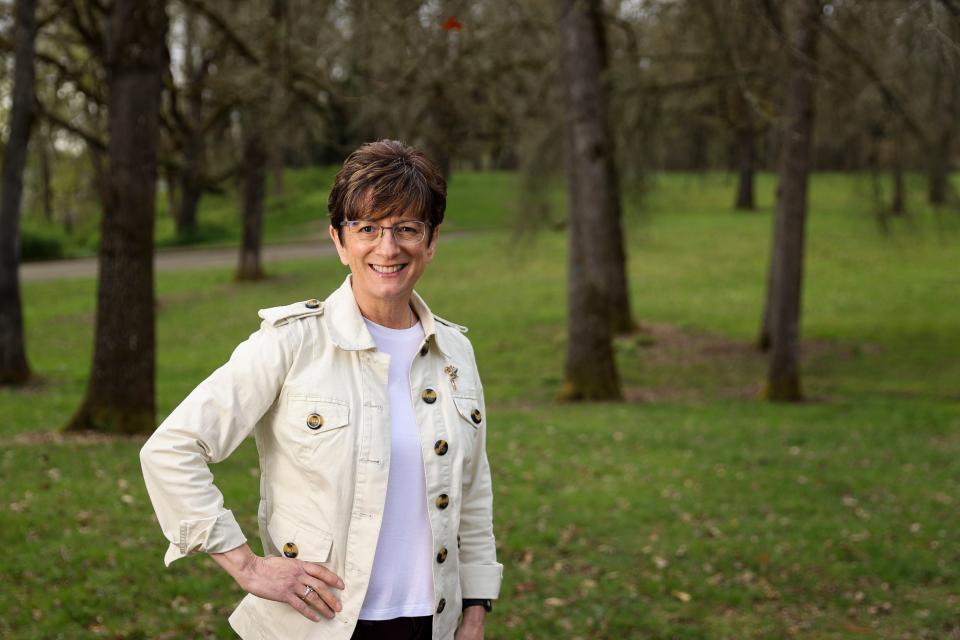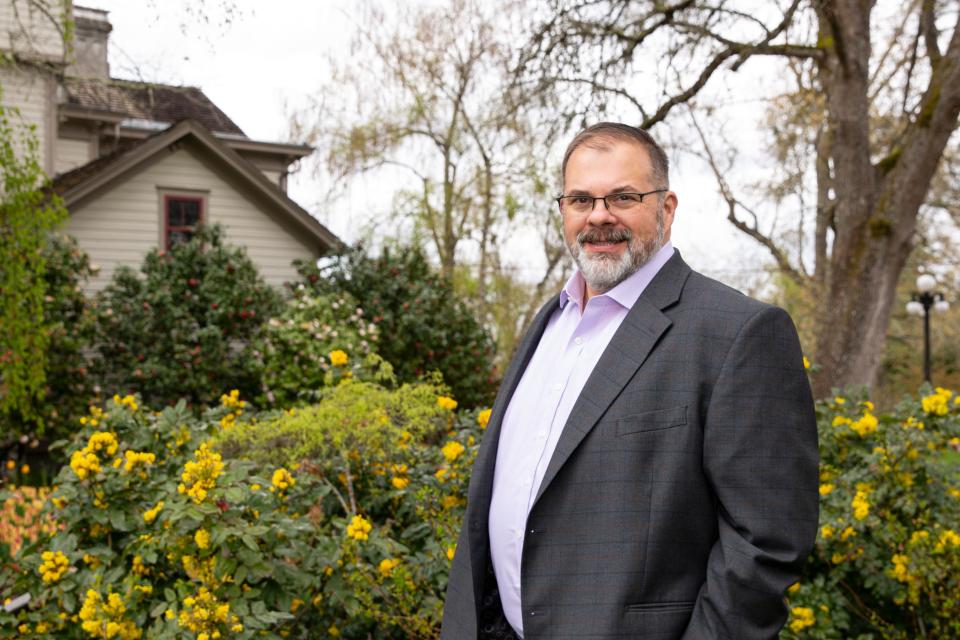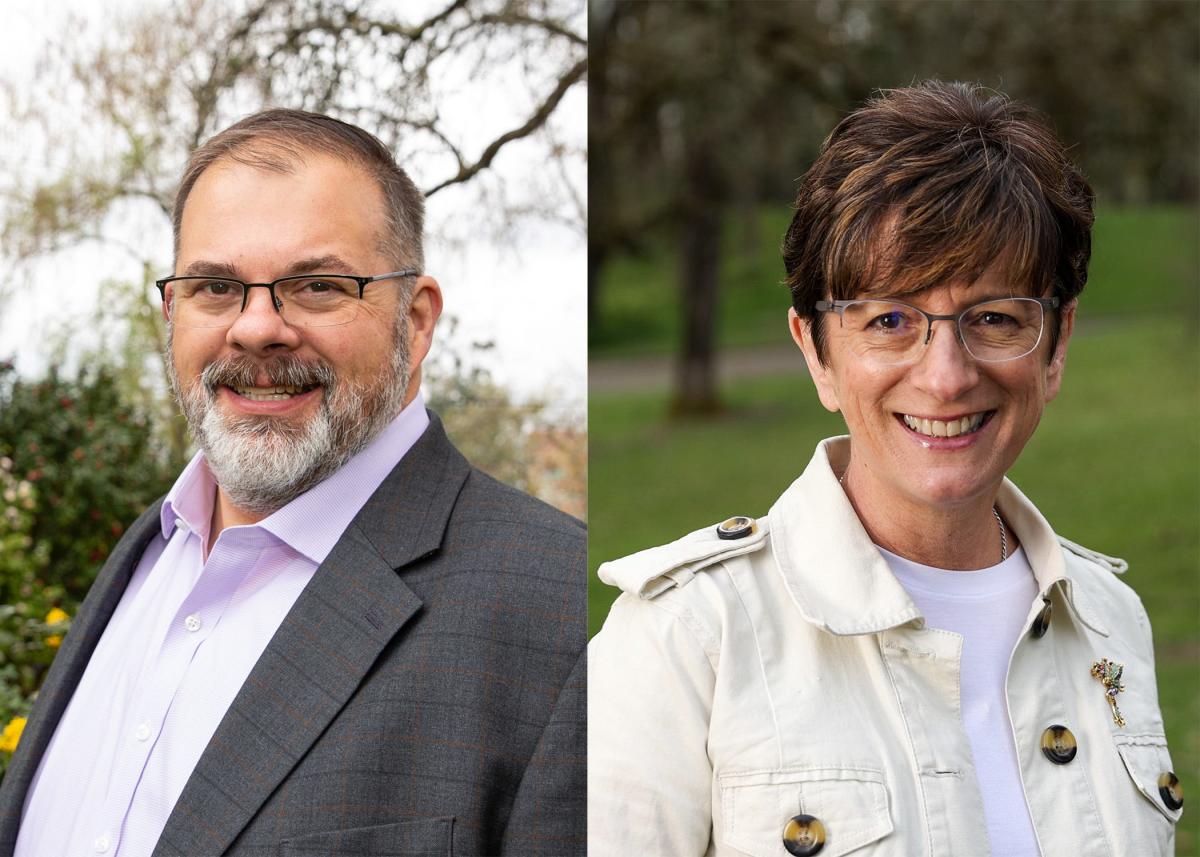This is part of a series of stories on the candidates running in the May 21 primary election. Ballots will be mailed to voters May 1.
The Salem mayoral race pits an incumbent mayor against a sitting city councilor and is drawing record-breaking campaign dollars.
Mayor Chris Hoy is running against Ward 6 Councilor Julie Hoy.
Both Hoys hail from Ward 6, Salem’s northeastern ward. They are not related.
Supporters of Julie Hoy have contributed record amounts of donations. As of April 16, she had $193,990 in cash and in-kind contributions. Chris Hoy had $20,987.
The mayor is an unpaid, volunteer position. Contested mayoral races in Salem are common, but having a sitting councilor running against an incumbent mayor has defied recent unofficial decorum.
According to Statesman Journal archives, the last time an incumbent mayor faced such a challenger was in 2000, when Mayor Mike Swaim squared off with councilor Glenn Wheeler. That election also brought in big money, along with a contentious mystery mailer described as a “hit piece” on Swaim. The incumbent mayor prevailed in the primary despite being outspent 3-to-1.
With a looming budget crisis and hundreds living unsheltered, Salem faces several key issues in the coming years. The Statesman Journal asked the mayoral candidates to list the top three issues facing the city and what they would do to address these problems.
Both Hoys tout public safety, homelessness and city funding as top issues, but their approaches — and who they blame for the current challenges — differ.
A candidate needs 50% plus one of the votes to win outright in May. If the election is too close, a runoff ensues in November. The winner takes office in January.

Julie Hoy: Restauranter, councilor runs on accountability, homelessness, public safety
Julie Hoy, a longtime northeast Salem resident, co–owner of Geppeto’s Italian Restaurant and the current Ward 6 councilor, entered the race last year. She was elected to city council in 2022, replacing Chris Hoy when he was elected mayor.
Hoy and her husband bought Geppeto’s Italian Restaurant in 2017.
Before owning the restaurant, Hoy, a mom of two and now a grandma, was a composer, musician, singer, author and public speaker.
While raising her family, she also was active in her church ministry. In 2001, she helped form the non-profit Friends of Pimpollo to work with underserved children and families in southern Mexico by providing education, job training and scholarships.
Hoy is currently the Director Emeritus of Friends of Pimpollo.
During her 32 years of living and later running a restaurant in east Salem, she said she’s seen a marked decline in safety and security. She pointed to Measure 110, the law decriminalizing user amounts of drugs passed by Oregon voters in 2020 that was largely unwinded by this year’s legislature, as one of the causes of the decline.
“I have a lot of experience with that because I live in northeast Salem on Center Street, and the business that I own is on Lancaster,” she said. “We deal with a lot on a daily basis and it hasn’t gotten better; it’s gotten worse.”
The restaurant is in Marion County’s jurisdiction.
The tolerance of drug use and the fentanyl crisis, combined with a housing-first approach model, has made homelessness in the city worse, Hoy said.
“Handouts without accountability, I believe, is wrong,” she said, using kits handed out by the nonprofit HIV Alliance that include sterile needles, fentanyl test kids, condoms and a pipe, as an example.
She said recently she went downtown to get a harm reduction kit.
“At that point, I had everything I needed to do drugs except for the couple bucks of fentanyl I could easily get,” she said.
She credited Salem Housing Authority’s work to get people into supportive services and the city’s Salem Outreach and Livability Services, which was added in 2022 to address unmanaged encampments, as having a good approach to homelessness.
Hoy was an early critic of the unsuccessful payroll tax and voted against passing it last year.
“That might have been the turning point for me,” she said. “I (thought), ‘You know what, I need to do something more because this … this shouldn’t be happening. Especially when I don’t believe that we really know what’s going on with the budget. It’s just been status quo for so long.”
While campaigning, Hoy has stressed the city doesn’t have a budget problem, it has a “priorities problem.”
She has made investment in public safety a key part of her platform.
During the March 21 budget meeting, she asked when she could put forth a motion to prioritize public safety funding. When asked whether closing the library would be an acceptable tradeoff for prioritizing public safety funding, she said it was lazy to let budget conversations devolve into pitting public safety against the library.
“Public safety comes first,” Hoy said. “That doesn’t mean we don’t get to have a library. That means we just need to find a better way to budget to provide the things that the community needs and wants.”
When asked what sets her apart from Chris Hoy, she highlighted her experience and perspective coming from the private sector.
“I haven’t worked within a system,” she said. “I’ve had to work to figure out how to survive in my personal business, in the restaurant business, through a pandemic.”
More information on Julie Hoy’s campaign can be found at julieforsalem.com.


Chris Hoy: Mayor, retired undersheriff seeks second term to continue work on homelessness, housing, budget
Chris Hoy grew up on the Oregon Coast working on the docks and boats in his family’s fishing operation. A fourth-generation Oregonian, he moved to Salem as a teen to attend Willamette University.
After graduating, he worked at local law enforcement agencies, joining the Lincoln, Marion and Clackamas county sheriff’s offices, eventually becoming Clackamas County’s undersheriff. He retired in 2019.
Hoy said he’s lived in the same house in northeast Salem since 2004 and has two rescue dogs.
He is chair of the Salem Housing Authority Board of Directors, serves as vice-chair of the Mid-Willamette Homeless Alliance Board of Directors and volunteers with the Center for Hope and Safety Advisory Committee.
Hoy was elected to Salem City Council in 2017 following the sudden resignation of the Ward 6 councilor. He won reelection in 2018.
He also was appointed to serve as a state representative until the end of 2022. When appointed, Hoy said he had no plans to run for the Legislature.
In 2022, he threw his hat in the ring to replace departing Mayor Chuck Bennett. Despite being outspent by tens of thousands of dollars in a record-breaking campaign fundraiser season, Chris Hoy won by 11 points.
He took office two months early after Bennett resigned to move to Ohio. Mayoral terms are shorter than councilor terms — two years instead of four. Hoy said there was never a debate in his mind of whether he’d seek re-election.
“Although we’ve gotten a ton of stuff done, I feel like we are just getting started,” he said.
He said when he joined city council in 2017, the city wasn’t spending a dime on homelessness. Trying to address the dire needs in the community was a “hard-fought battle.”
Budget documents from 2016 to 2017 mention a taskforce underway to reduce homelessness in Salem but show no major funding allocations specifically for homelessness.
The city’s budget from fiscal year 2024 outlines millions spent on homelessness, including $625,000 for the Housing Rental Assistance Program, $410,000 for the Safe Park and warming networks, and $970,230 for the Salem Outreach and Livability Services team along with more than $5 million for the Navigation Center in fiscal years 2023 and 2024.
Hoy said he’s proud of the work the city’s done to address homelessness and getting unsheltered people into managed microshelter sites, Salem’s first-of-its-kind Navigation Center and permanent supportive housing sites.
“To see where we’ve come just since 2017 … it’s a lot for a city our size,” he said. “I am so proud of that.”
He also highlighted his work to bring commercial air service back to Salem and break down barriers to bring business, housing and commercial development to the city.
He said a key issue will be addressing the revenue and budget shortfall in Salem. He pointed to the state’s broken property tax system that has left cities struggling.
Leaders have pointed to Oregon’s property tax system and tax laws passed in the 1990s that have limited the amount of tax cities can collect and not kept pace with Salem’s growth as well as the tax-exempt properties within city limits.
“Until we fix that, we’re just going to keep struggling,” Hoy said. “We have a short-term problem and a long-term problem, and I want to work on both… We’ve got to keep the library open and we’ve got to keep the police funded. It’s a huge challenge.”
Hoy said his support in passing the payroll tax stemmed from knowing the general fund was limited, and the city would face hard decisions and sacrifices — like the current cuts looming for parks, police and libraries — if it didn’t find more revenue.
“We knew it wouldn’t be popular, but we also know that people were demanding services,” he said. “Now they’ve spoken and we’re going in different directions to figure something else out… It’s easy to be against things. Leadership takes being for something.”
He said his practical experience working to accomplish goals and collaborate with community partners sets him apart from Julie Hoy.
“I have practical experience, and I don’t just ask questions, I help deliver solutions,” he said. “That’s a huge difference.”
He said when he listens to Julie Hoy talk in meetings, he feels like he lives in a different city from her, despite living in the same ward.
“I don’t live in the dystopian hellscape she describes every week or two weeks,” Chris Hoy said. “Are there problems and challenges? Absolutely. Every city has some challenges, but I have great hope for the city. I believe in Salem.”
More information can be found on Chris Hoy at chrishoyforsalem.com.
Record-breaking campaign spending, mostly from Julie Hoy
The 2024 mayor’s race is slated to be the costliest in recent history, with Julie Hoy on track to surpass $200,000 in fundraising.
Her major donors include the Oregon Realtors Political Action Committee, real estate developer Mountain West Development Corporation, Commercial Property Resources, and Larry Tokarski, the president of Mountain West and co-founder of Salem Reporter.
Chris Hoy has raised $20,987, meaning he is being outraised nearly 10:1. His major donors include individuals including Nadene LeCheminant, Councilor Trevor Phillips, Frank Taussig and Claudia Burton, with the bulk of his donations coming in amounts less than $1,000.
For questions, comments and news tips, email reporter Whitney Woodworth at wmwoodworth@statesmanjournal.com, call 503-910-6616 or follow on Twitter at @wmwoodworth
This article originally appeared on Salem Statesman Journal: Hoy vs. Hoy in the race to be Salem’s next mayor
